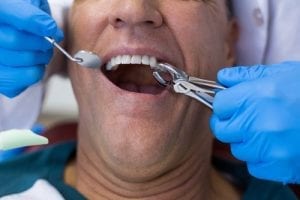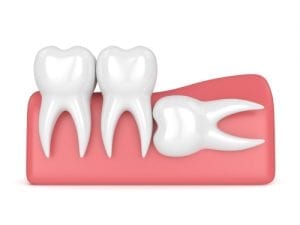Posted September 21, 2019 in Dental Bridge, Dental Crowns, Extraction, Periodontal or Gum Disease
Sometimes, you have to get a tooth pulled. It’s no walk in the park, but it is a necessary part of maintaining dental health in cases where leaving the tooth in question could pose an array of other—often much more serious—health concerns.

Impaction, tooth decay, periodontal and gum disease, trauma, or tooth overcrowding are all reasons a dentist may recommend a tooth extraction. Some of these conditions, like tooth decay or some gum diseases, can be avoided through preventative care like general check-ups and dental sealants, while others (impaction, trauma, and overcrowding) are just a matter of happenstance.
When Should I Get a Tooth Extraction?
As the title suggests, there are five main reasons that you may need to get a tooth removed:
Impaction
Tooth impaction occurs when the growth of one tooth pushes directly against another. The tooth is susceptible to infection, causing red, swollen, tender, or bleeding gums. People who experience this condition often report pain and swelling around the jaw and difficulty opening their mouths.

Typically, the culprit for this condition is the wisdom teeth, the third set of molars that don’t have enough room in the mouth to grow upright, so they instead grow inward toward the rest of the teeth. In these cases, it is best to have the wisdom teeth removed as soon as possible to prevent further damage to the other teeth.
Tooth Decay
The build-up of tartar and plaque causes tooth decay. These deposits eat away at the enamel of the teeth, making them weak and brittle. If the condition gets bad enough, then an infection can develop, causing intense pain, swelling, and redness. Once a tooth reaches this point, it may be necessary to completely remove the tooth and replace it with a dental bridge to avoid further health concerns.
Periodontal or Gum Disease
Similar to tooth decay, periodontal and gum disease is often caused by the build-up of plaque and tartar on the teeth. While there are many different conditions that people can develop in the gums and the bone surrounding the teeth, the two most common are gingivitis and periodontitis.

Gingivitis is an inflammation of the gums surrounding the teeth, while periodontitis is the inflammation of the bones and tissues surrounding the teeth.
If the integrity of the bone or gum around the tooth deteriorates too much, then it may be necessary to remove the tooth in favor of a dental bridge or dental crown to preserve the surrounding teeth.
Trauma
Teeth are often some of the first casualties in an accident. Whether it has to do with a stray baseball coming at you at record speed or being involved in a car crash, accidents can wreak havoc on the teeth.
Sometimes, an accident causes a tooth to become too damaged to save. When this is the case, tooth extraction is a necessary part of the recovery process. Otherwise, a damaged tooth could become severely infected and eventually require a procedure like a root canal that can be just as painful.
Overcrowding
Aside from pain, tooth impaction can also cause overcrowding of the teeth, which can further cause otherwise straight and well-aligned smiles to become crooked. Removing the problematic teeth in the back of the mouth can open up free space for the rest of the teeth to spread out as needed, preserving your straight smile without the need for braces.
What Should I Expect During a Tooth Extraction?
For a simple tooth extraction, the dentist will typically extract the tooth with forceps and a local anesthetic. In the case of an impacted tooth, a surgical extraction may be required, which involves cutting open the gums and removing the tooth.

It is important to rest and keep yourself limited to a soft food diet after your extraction. Visit our tooth extraction page for a more thorough explanation of the extraction procedure and recovery.
It is also important to remember that your dentist will attempt every other remedy possible before deciding to remove your tooth. However, in some cases, the only way to protect your mouth is to remove the tooth entirely.
If you are experiencing any of these symptoms or would like to get more information on tooth extraction, schedule a consultation online, or give our office a call at (575) 524-3722.